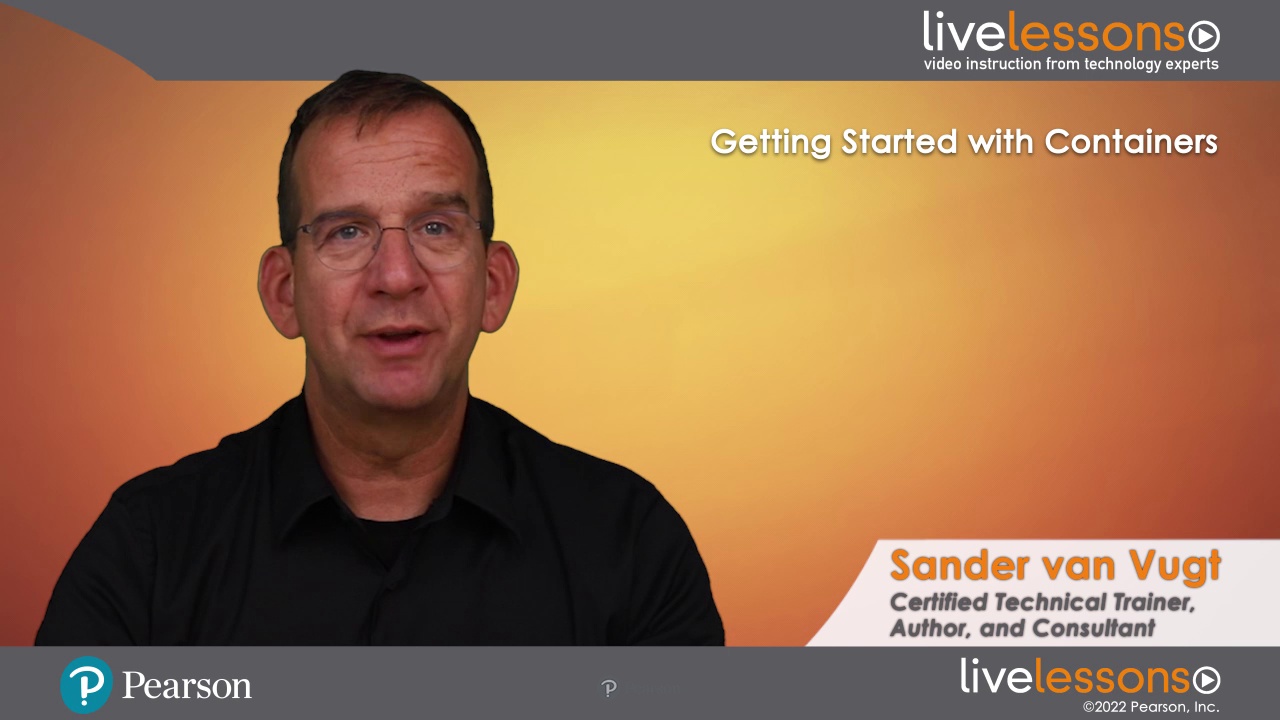Getting Started with Containers (Video Training)
- By Sander van Vugt
- Published Nov 4, 2021 by Addison-Wesley Professional.
Online Video
- Your Price: $239.99
- List Price: $299.99
- About this video
Video accessible from your Account page after purchase.
Register your product to gain access to bonus material or receive a coupon.
Description
- Copyright 2022
- Edition: 1st
- Online Video
- ISBN-10: 0-13-764957-6
- ISBN-13: 978-0-13-764957-0
6 Hours of Video Instruction
Learn everything you need to know about using Containers with either Docker or Podman.
Containers are everywhere. Getting Started with Containers LiveLessons covers a wide range of topics that will get you started on your containers journey. The course begins with an overview of the basics and key topics of what containers are and goes in depth of what working with containers entail. Each lesson provides detailed training followed by a hands-on lab, so you can practice your skills and extend your containers knowledge.
In more than 6 hours of engaging video training, experienced instructor Sander van Vugt teaches the essentials of containers; what a container is and how containers radically change the way we work. Getting Started with Containers LiveLessons will cover all the items that are important for running containers, including using and creating container images, providing persistent container storage, and providing access to containers. Taught using screencast with lightboard training and full demos, this is the course you need to truly understand containers.
Topics include
- Understanding Containers
- Exploring the Container Landscape
- Getting Started with Docker
- Performing Daily Container Management
- Using Containers on RHEL
- Managing Container Images
- Managing Container Storage
- Managing Container Networking
- The Role of Container Orchestration
Skill Level
- Beginner to Intermediate
Learn How To
- Get started with Docker or Podman
- Perform daily container management
- Create and manage container images
- Manage container persistent storage
- Manage container networking
- Understand the role of container orchestration
Who Should Take This Course
- This course is developed for anyone who wants to learn about containers.
Course Requirements
A virtual or physical machine with the latest version of Ubuntu LTS installed for practicing the Docker-based parts of this course
- A virtual or physical machine with the latest version of Rocky Linux for the Podman-based parts of this course
About Pearson Video Training
Pearson publishes expert-led video tutorials covering a wide selection of technology topics designed to teach you the skills you need to succeed. These professional and personal technology videos feature world-leading author instructors published by your trusted technology brands: Addison-Wesley, Cisco Press, Pearson IT Certification, Sams, and Que. Topics include: IT Certification, Network Security, Cisco Technology, Programming, Web Development, Mobile Development, and more. Learn more about Pearson Video training at http://www.informit.com/video.
Video Lessons are available for download for offline viewing within the streaming format. Look for the green arrow in each lesson.
Sample Content
Table of Contents
Lesson 1: Understanding Containers
1.1 What is a Container?
1.2 Containers are Linux
1.3 Understanding Why Containers Make Sense in a Microservices Approach
1.4 Understanding Images and Containers
1.5 Understanding Container Registries
1.6 Taking a Docker Test-drive
Lesson 1 Lab: Taking a Container Test-drive
Lesson 1 Lab Solution: Taking a Container Test-drive
Lesson 2: Exploring the Container Landscape
2.1 Understanding Container Origins
2.2 Understanding Container Standardization
2.3 Understanding Container Runtimes
2.4 Understanding Container Orchestration
2.5 Exploring LXC/LXD
Lesson 2 Lab: Running LXD Containers
Lesson 2 Lab Solution: Running LXD Containers
Lesson 3: Getting Started with Docker
3.1 Installing Docker
3.2 Running a Docker Container
3.3 Verifying Container Availability
3.4 Investigating Containers on the Host OS
Lesson 3 Lab: Creating Docker Containers
Lesson 3 Lab Solution: Creating Docker Containers
Lesson 4: Performing Daily Container Management
4.1 Running Containers
4.2 Managing Containers Resource Limitations
4.3 Inspecting Containers
4.4 Managing Running Containers
4.5 Managing Container Environment Variables
4.6 Using docker-compose
4.7 Troubleshooting Containers
Lesson 4 Lab: Managing Containers
Lesson 4 Lab Solution: Managing Containers
Lesson 5: Using Containers on RHEL
5.1 Understanding RHEL 8 Container Solutions
5.2 Managing Access to Registries
5.3 Running Containers with podman
5.4 Understanding Rootless Containers
5.5 Understanding Rootless Containers UID Mappings
5.6 Managing Images with buildah
Lesson 5 Lab: Managing Podman Containers
Lesson 5 Lab Solution: Managing Podman Containers
Lesson 6: Managing Container Images
6.1 Understanding Container Images
6.2 Building Images with Dockerfile
6.3 Building Images with docker commit
6.4 Using Tags
6.5 Creating Private Registries
6.6 Automating Image Builds from Git Repositories
6.7 Image Use Best Practices
Lesson 6 Lab: Automating Image Builds
Lesson 6 Lab Solution: Automating Image Builds
Lesson 7: Managing Container Storage
7.1 Understanding Container Storage
7.2 Understanding Storage Drivers
7.3 Using Bind Mount as Container Storage
7.4 Using Volumes for Persistent Storage
7.5 Using NFS for Persistent Storage
7.6 Managing Storage in an SELinux Environment
Lesson 7 Lab: Configuring Persistent Storage
Lesson 7 Lab Solution: Configuring Persistent Storage
Lesson 8: Managing Container Networking
8.1 Understanding Container Networking
8.2 Understanding Bridge Networking
8.3 Working with Default Bridge Networking
8.4 Creating a Custom Bridge Network
8.5 Understanding Networking for Rootless Container
8.6 Understanding Microservices Container Networking Needs
Lesson 8 Lab: Implementing Custom Networking
Lesson 8 Lab Solution: Implementing Custom Networking
Lesson 9: The Role of Container Orchestration
9.1 Understanding Enterprise Container Requirements
9.2 Exploring the Container Orchestration Landscape
9.3 Understanding Kubernetes
9.4 Taking a Kubernetes Test Drive
Lesson 9 Lab: Investigating Kubernetes
Lesson 9 Lab Solution: Planning for Orchestration in the Course Project
More Information

